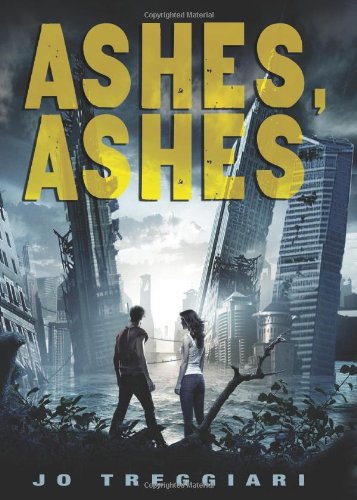Last week we introduced our Dystopian vs. Post-Apocalyptic Saturday feature that will go through the end of March. It will be filled will guest posts on the topic and what better way to start a discussion on post-apocalyptic vs. dystopian novels then to start with an author's perspective?!?! Today we have the honor of having Jo Treggiari, the author of Ashes, Ashes, as a guest blogger. Before I share her post, why don't I tell you some about her.
 |
| photo by Kate Inglis, 2010. www.kateinglis.com |
Jo Treggiari was born in London, England but grew up in Canada, Roccasinibalda, Italy and California.She used to work in the music industry and eventually owned her own indie record label. The first CD the label ever put out was by a gangsta rap group. They also did alt rock and punk. She has trained as a boxer and could have been a contender. (Not really).
Jo started writing stories for my little sister when she was about 8. Often she would rework fairytales so that the princesses had a little more grit. Then she would write them out on white paper, roll them up and tie with a red ribbon. Later on in high school Jo penned personalized naughty limericks by request. She love dogs, crows, and octopi. She blogs. And she enjoys baking desserts.
Jo's first book, a middle-grade fantasy, The Curious Misadventures of Feltus Ovalton, came out in 2006. Her post-apocalyptic adventure, Ashes, Ashes, was published June 1, 2011 by Scholastic Press. She recently finished a punk rock YA- Fierce and is working on an urban fantasy, Briny Deep.
 I was lucky enough to have the opportunity to read Ashes, Ashes for ALAN Picks. Here is my review:
I was lucky enough to have the opportunity to read Ashes, Ashes for ALAN Picks. Here is my review:
Title: Ashes, Ashes
Author: Jo Treggiari
Author: Jo Treggiari
Publisher: Scholastic
Publication Date: June, 2011
Genre/Format: Science Fiction- Post Apocalyptic/Novel
Summary:
What I Think:
Now onto Jo...
The Zeitgeist
When I first got the idea for Ashes, Ashes, I was spending my time
between New York City and upstate New York, caught amidst the contrast of
woodland and rolling pasture, and steel girders, concrete and glass. I called
it the summer of the snapping turtle because it seemed I was constantly
stopping the car to move them out of the road.
I remember how it felt to leave the
city behind. Much as I loved it, there was a lightening around my heart
whenever I passed the limits and headed out into the green. I could breathe. I
had plans for a huge vegetable garden with zucchini for everyone. I was reading
a survival diary at the time and I wanted to forage among the trees for edible
mushrooms and ramps and loganberries. One of my oldest friends had been swept
out to sea during the Indian Ocean tsunami and survived. All these ideas and
experiences went into the stew of my mind and started to whirl around.
Ideas come as little seeds. Sometimes
they fall on dry ground and nothing happens. Sometimes they turn into bigger
ideas. And books. Sometimes being a new mother (for the 2nd time),
stuck at home during an unseasonably hard and cold winter is the most fertile
ground.
I wrote Ashes, Ashes in a big swooping frenzied rush, imagining the worst
that could happen to my beloved New York City and the people who lived there
after earthquake and flood, pandemic and drought. I wondered what would happen
if technology failed and the wilds started creeping in and taking over. It was
hardly a unique idea. I’d grown up on books like the Swiss Family Robinson,
1984, and My Side of the Mountain, and disaster movies like Escape from New
York and Planet of the Apes, not to mention the real disasters in my lifetime-
war, poverty, epidemic, greed, starvation, global warming, resource depletion,
the nuclear threat, corruption.
And apparently I was not the only one
ruminating on this sort of stuff. It might appear as if The Hunger Games
trilogy came out and then presto, the next day there were a bunch of new
post-apocalyptic and dystopian YA books on the shelves.
Because you know it was a super-trend.
And a lot of us kid lit authors are psychic. ;)
In fact I was already working on Ashes, Ashes well before that. And
knowing how long it takes to write a book and sell a book and publish a book, I
think I can safely say that all us writers were knee-deep in our manuscripts
way before this most recent love affair with all things nihilistic and hopeless
began.
We tapped into something universally
visceral and urgent because it was what we were thinking about.
It’s sort of like when the Ramones in
NYC and the Clash in London both decided at the very same time to play short,
fast songs filled with nihilism, outrage, and hopelessness. It’s the zeitgeist.
And the same reason we wrote these books, is the same reason people like them.
We are all worried about our future and we all express those anxieties and
fears in our writing because it is cathartic and it helps us to make some kind
of sense of it. And reading about the human spirit is cathartic too.
But here’s what’s really cool. Yes, it
seems that there is a plethora of PA and Dystopian books but for the most part
they are vastly different. You’ve got The
Hunger Games, but you also have Enclave, Ashes, and Legend, Ashfall, Carrie
Ryan’s Forest of Hands and Teeth
trilogy, Blood Red Road, Divergent, and Across the Universe, Matched
and Delirium. Umm, and Ashes, Ashes. (Clearly using ‘Ash’ in
your title is part of the zeitgeist too).
Some deal with a corrupt social order
and the loss of individual freedoms. Some deal with the aftermath of the
apocalypse. Some take a Sci-Fi approach. Some have zombies. Some explore
survival and how humans rebuild or find new ways to live.
I’d say that along with the grim
depiction of the world, the thing they all have in common is the fight. These
are stories of helpless or powerless or beaten down or unprepared people
deciding to fight. And who out there,
especially among the high-school aged readers, has not felt powerless?
It feels fresh. It feels acutely
relevant. And although I talked about hopelessness and nihilism in the first
section of this post, I don’t think any of these books would work without that
spark of human ingenuity, that drive to survive, that ability that we have to
try and fix things and make things right and re-imagine our future.
And I believe that’s what
resonates with readers. Sure it’s sort of scarily fun to vicariously experience
your worst nightmares. I mean, that’s why people go to the circus right? To see
the trapeze artist fall or the lion tamer have his head bitten off. So a New York City that has been crumbled
into the earth is oddly comforting because as bad as things get with weird
earthquakes and Armageddon snows (see how we love our disaster movie-themed
lives!), it probably won’t get that bad. At least we don’t have zombies. Yet.
Jo hits it right on the head. It is through these novels of disaster, destruction and devastation that the readers find hope. Thank you so much Jo for guest blogging for us and starting off the feature. You can learn more about Jo at http://jotreggiari.com.
We will see you next week for another guest post,








No comments:
Post a Comment